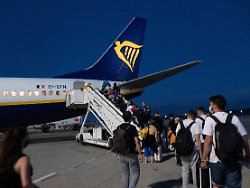Monday 23 August 2021
Few rules despite record output
How cheap can flying be?
Airlines lure their customers with flights at junk prices. But is that still justifiable in view of the climate crisis? The topic has long since arrived in the election campaign. In the eyes of environmentalists, however, despite ambitious plans, politicians are still acting far too cautiously.
Flying at any cost? A few months ago this question was the subject of a lively political debate. Annalena Baerbock, candidate for Chancellor of the Greens, said in an interview that short-haul flights such as from Hamburg to Berlin should “no longer exist in the long term” in the interests of more environmental and climate protection.
The SPD chancellor candidate Olaf Scholz, who is currently spurred on by good poll numbers, announced that he would take action against cheap flights. But is it that simple? And can junk prices be eliminated just like that? The subject is more complex than some election campaign slogans. Even in the EU, more effective climate protection in air traffic will not be feasible overnight – even if the Commission presented ambitious plans in July.
Aviation currently accounts for around 2.5 percent of global CO2 emissions. If you look at 2019, i.e. the year before the pandemic, with a global record emission of 38 billion tons of carbon dioxide, around 950 million tons of CO2 were attributable to air traffic.
The other climate-damaging effects that occur when flying are not yet taken into account. Other pollutants such as sulfur and nitrogen oxides increase the negative effects on the climate because the bottom line is that they also lead to warming in the earth’s atmosphere. Experts point out that these so-called “non-CO2 effects” are by no means reflected in the ticket prices for flights.
EU plans are slow to take effect – if at all
In its “Fit for 55” climate package, the EU Commission is proposing, among other things, the introduction of an energy tax on kerosene. But even this should only apply from 2023 and increase gradually over ten years – provided that the member states agree to this plan at all. “The full tax rate would not have to be paid until 2033,” says Wolfgang Bretschneider, environmental economist at the Federal Environment Agency (UBA). So far, exempting shipping and air traffic from this “kerosene tax”, as it is also called, is “a distortion of competition at the expense of the environment,” says the expert.
Activists and researchers have long criticized such exceptions. The Fridays-for-Future activist Pauline Brünger, for example, is calling for “all subsidies for the aviation industry” to be cut. The industry should “no longer be rewarded with state money for its climate destruction,” says Brünger. The Federal Association of the German Aviation Industry, however, warns against introducing a kerosene tax or new taxes of any kind. An additional kerosene tax would only mean that third-country airlines could avoid it, argues the association.
It is so far unclear whether a kerosene tax would also lead to more expensive flight tickets. “You can’t say: an intra-European kerosene tax will be passed on one-to-one to the end consumer or to the passengers,” says UBA expert Bretschneider. However, the Commission is not planning an EU-wide VAT on flight tickets, as it already exists in domestic German air traffic. Bretschneider also sees the introduction of a kerosene tax as having “positive effects on climate protection”. The airlines received “economic incentives to reduce fuel consumption,” he says.
Industry continues to grow
But until that takes effect, air traffic will continue to grow steadily – the temporary pandemic low will probably not have changed that. According to a UBA report (as of October 2020), the aircraft manufacturer Airbus expects the global aircraft fleet to double by 2036. In Germany, too, the number of passengers has tripled in the past 28 years, according to the report with the appropriately ambiguous title “Where are you going?” This growth leads to “more emissions, more noise and higher consumption of resources,” the authors write.
After all, growth in international aviation should be CO2-neutral from 2020 onwards. This means that airlines worldwide finance CO2-reducing climate protection projects in order to offset the emissions from air traffic. An important mechanism because: The proportion of clean fuels in air traffic is still negligible at 0.05 percent. According to the EU’s will, it should make up at least two percent by 2030. Fossil combustion will therefore continue for a long time – with the known consequences for the climate.
Airlines like the Irish company Ryanair are fueling the trend with low-cost offers. On request, Ryanair guarantees that it emits 25 percent less CO2 per passenger and kilometer than major European competitors. One is “the greenest airline in Europe”. The company has pledged to operate 12.5 percent of all flights with sustainable kerosene by the end of the decade. For the time until the end of the summer, Ryanair has announced another target: continue to have the cheapest possible flight tickets.
.
